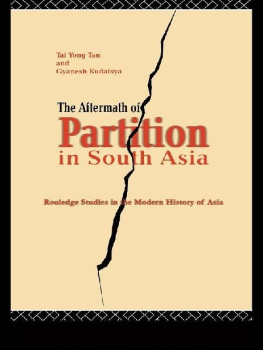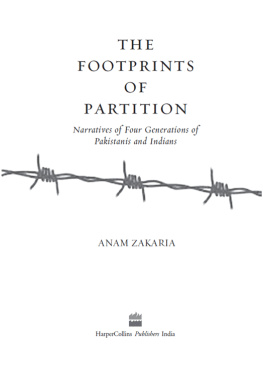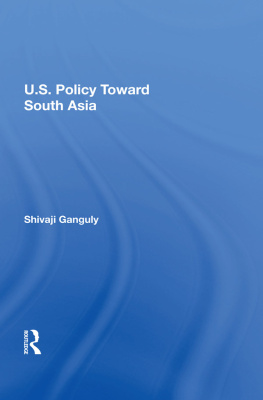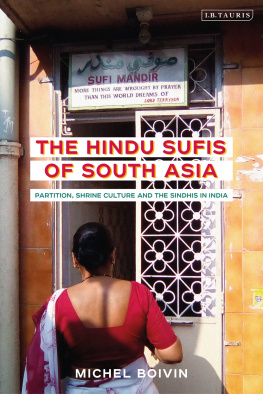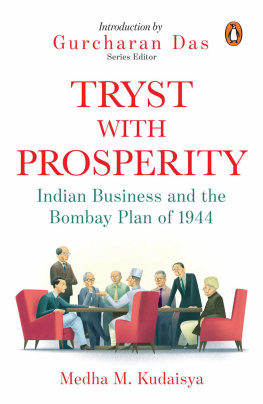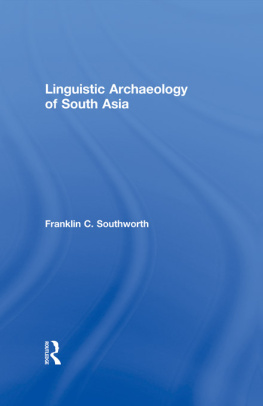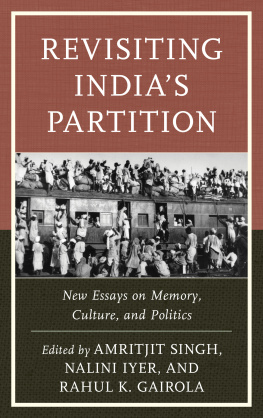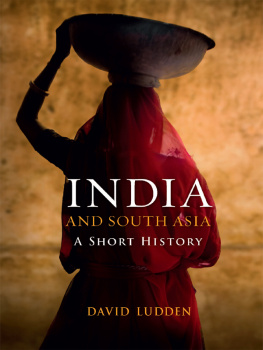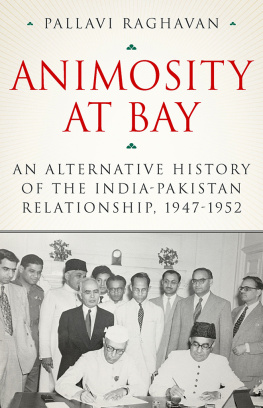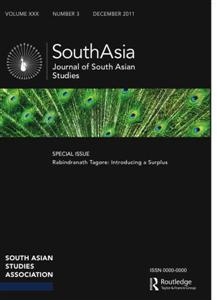The Aftermath of Partition inSouth Asia
A valuable academic study of the subcontinent which is accessible to the seriousgeneral reader and enhances our understanding of some of its most intractableproblems.
Judith M.Brown, Beit Professor of Commonwealth History, University of
Oxford
The partition of the Indian subcontinent in 1947 was a defining moment which has powerfully shaped the destinies of people in the South Asian region. The birth of nation-states of India and Pakistan produced reverberations which were both immediate and long-term. This book focuses on the aftermath of partition and takes stock of its long-term consequences.
Earlier works on partition have portrayed it as a tragic and unintended consequence of decolonization, or subordinated it to the larger dramas surrounding the advent of independence. This book sees partition in its own terms. It argues that it was not a single event, but a trigger of processes which have left a deep imprint on state and society in the region. Where other books have looked only at the causes of partition, this book broadens the horizon by looking at its effects. It is constructed around two key motifs: the dislocations and disruptions, and the long-term impact of partition on peoples, places and institutions.
The Aftermath of Partition in South Asia draws upon new theoretical insights and fresh bodies of data to reappraise partition historically in the light of its long aftermath. It uses a comparative approach by viewing South Asia in its totality, rather than looking at it in narrow national terms. As the first book to focus on the aftermath of partition, it fills a distinctive niche in the study of contemporary South Asia. It will be important reading for scholars and students of the History and Politics of South Asia and to those concerned with decolonization in general.
Tai Yong Tan is Associate Professor in the Department of History, National University of Singapore. Gyanesh Kudaisya is Assistant Professor in the South Asian Studies Programme at the National University of Singapore.
Routledge Studies in the Modern History of Asia
1 The Police in Occupation Japan
Control, corruption and resistance to reform
Christopher Aldous
2 Chinese Workers
A new history
Jackie Sheehan
3 The Aftermath of Partition in South Asia
Tai Yong Tan and Gyanesh Kudaisya
4 The Australia-Japan Political Alignment
1952 to the present
Alan Rix
5 Japan and Singapore in the World Economy
Japans economic advance into Singapore, 18701965
Shimizu Hiroshi and Hirakawa Hitoshi
6 The Triads as Business
Yiu Kong Chu
7 Contemporary Taiwanese Cultural Nationalism
A-chin Hsiau
8 Religion and Nationalism in India
The case of the Punjab
Harnik Deol
The Aftermath of
Partition in South Asia
Tai Yong Tan and Gyanesh Kudaisya
First published 2000
by Routledge
11 New Fetter Lane, London EC4P 4EE
Simultaneously published in the USA and Canada
by Routledge
29 West 35th Street, New York, NY 10001
Paperback edition published
2002 By Routledge
Routledge is an imprint of the Taylor & Francis Group
This edition published in the Taylor & Francis e-Library, 2005.
To purchase your own copy of this or any of Taylor & Francis or Routledges collection of thousands of eBooks please go to www.eBookstore.tandf.co.uk.
2000 Tai Yong Tan and Gyanesh Kudaisya
All rights reserved. No part of this book may be reprinted or reproduced or utilised in any form or by any electronic, mechanical, or other means, now known or hereafter invented, including photocopying and recording, or in any information storage or retrieval system, without permission in writing from the publishers.
British Library Cataloguing in Publication Data
A catalogue record for this book is available from the British Library.
Library of Congress Cataloging-in-Publication Data
Tai Yong Tan.
The aftermath of partition in South Asia/Tai Yong Tan and Gyanesh Kudaisya.
336 pp. 15.623.4 cm
(Routledge studies in the modern history of Asia)
1. IndiaHistoryPartition, 1947. 2. IndiaHistory1947.
3. PakistanHistory. I. Title. II. Series.
DS480.842. Y66 2000
954.04dc 21 99089134
ISBN 0-203-45060-4 Master e-book ISBN
ISBN 0-203-45766-8 (Adobe eReader Format)
ISBN 0415289084 (Print Edition)
Maps and tables
Maps
Table
Brief biographical notes
Aizaz Rasul, Begum (1909) a prominent Muslim League leader from Uttar Pradesh; member of Constituent Assembly of India (MCA); subsequently joined Indian National Congress.
Ali, Chaudhury Mohammad (19051980) civil servant before 1947; Secretary-General to Government of Pakistan; subsequently Finance Minister and Prime Minister of Pakistan.
Auchinleck, Field Marshal Sir Claude John Eyre (18841981) Commanderin-Chief, India, January-July 1941 and from 1943 to 1947.
Azad, Abul Kalam (18881958) scholar and nationalist leader; President of Indian National Congress 1923 and 193946; Minister for Education in Government of India 194758.
Bhargava, Gopi Chandra (18901966) member of the Legislative Assembly (MLA), Punjab; Chief Minister of East Punjab after 1947.
Campbell-Johnson, Alan (1913) Press Attache to Viceroy, 19468.
Caveeshar, Sardul Singh (18861963) prominent Punjab leader; President, All India Sikh League 1920; Secretary and later Acting President, Punjab Provincial Congress Committee, 19312; President, All India Forward Bloc, 19418.
Correa, Charles M. (1930) one of the best-known Indian architects.
Cripps, Sir (Richard) Stafford (18891952) Member of UK Parliament (Labour); carried constitutional proposals to India in 1942; member of Cabinet Mission to India in 1946; President, Board of Trade from 1947.
Darling, Sir Malcolm (18891952) member of the Indian Civil Service in Punjab before 1947; well known also for his studies of village life.
Doxiadis, C.A. (19131975) internationally known Greek architect; prepared the master-plan for Islamabad and was responsible for many of its buildings; proponent of Ekistics, a new approach to human habitation.
Gandhi, M.K. (18691948) barrister from Gujarat who trained Indians in South Africa to resist injustices by non-violent passive resistance; on return to India in 1915 adopted same methods to resist British rule; lauded as Father of the Nation by Indians; assassinated by a Hindu fanatic.
Gidwani, Choithram (18891957) President of Sindh Provincial Congress Committee, 1947.
Gupta, Saibal Kumar (19021989) member of Indian Civil Service; District and Sessions Judge, 193147; Chairman of Calcutta Improvement Trust, 195060; Chairman of Dandakaranya Development Authority.
Hamid, Shahid Military Secretary to the Commander-in-Chief, India, till August 1947; subsequently joined the Pakistan army.
Hussain, Altaf (1953) founder of Muhajir Quami Mahaz; now in exile in London.
Iqbal, Sir Mohammad (18761938) an influential Islamic philosopher and poet in Persian and Urdu; widely regarded as the spiritual inspiration behind the idea of Pakistan.
Ismay, Hastings Lionel, 1st Baron Ismay of Wormington (18871965) Chief of Viceroys Staff, 1947.
Jallundary, Hafeez (19001980) Urdu poet who composed the Pakistan national anthem.
Jenkins, Sir Evan Meredith (18961985) member of Indian Civil Service, Private Secretary to Viceroy, 19435; Governor of Punjab, 19467.


